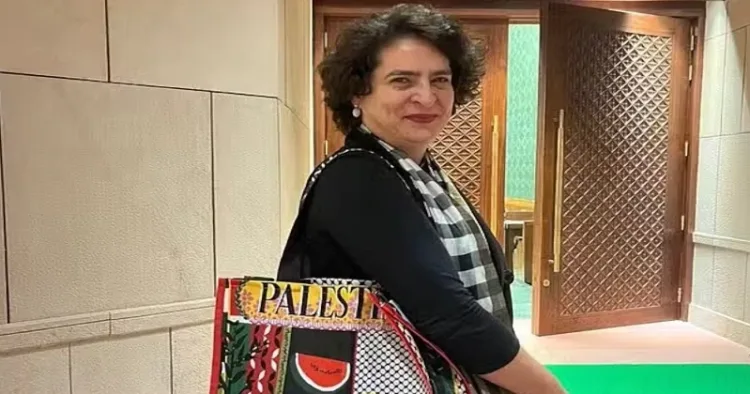Congress leader and newly elected Member of Parliament from Wayanad, Priyanka Gandhi Vadra, ignited a heated debate on December 16, when she walked into Parliament carrying a bag prominently emblazoned with the word “Palestine” and decorated with Palestinian symbols, including a watermelon—an internationally recognised emblem of resistance. The gesture, perceived as a statement of solidarity with Palestinians, comes against the backdrop of her vocal criticism of Israel’s actions in Gaza.
Gandhi’s choice of accessory, which bore a clear pro-Palestinian message, was captured by Congress spokesperson Shama Mohamed and widely shared on social media. The move follows a recent meeting between Gandhi and Abed Elrazeg Abu Jazer, the acting head of the Palestine Embassy in New Delhi. During the meeting, held at Gandhi’s residence in Delhi, Jazer congratulated her on her election victory from Wayanad and discussed the ongoing conflict in Gaza. He urged India to take a leadership role in advocating for a ceasefire and supporting Gaza’s reconstruction efforts.
This gesture aligns with Gandhi’s history of strong statements against Israel’s military operations in Gaza. Over the years, she has accused Israeli Prime Minister Benjamin Netanyahu’s government of “genocidal actions” and “barbarism,” urging global leaders to denounce such actions and pressure Israel to halt its military campaigns.
Gandhi’s solidarity with Palestine is not new. Earlier this year, in June, she accused Netanyahu of “genocidal actions” and described Israel’s military campaign as a violation of international law. Her fiery posts on X condemned the deaths of civilians, including children, healthcare workers, journalists, and aid workers in Gaza.
“It is the moral responsibility of every right-thinking individual, including all those Israeli citizens who do not believe in hatred and violence, and every government in the world to condemn the Israeli government’s genocidal actions and force them to stop,” she wrote in July.
Gandhi also criticised the Modi government for its silence on the issue, calling it a diplomatic failure and accusing it of aligning with oppressive regimes rather than standing up for universal human rights. The Bharatiya Janata Party (BJP) was quick to pounce on Gandhi’s latest display of solidarity, branding it as another example of the Congress party’s so-called “appeasement politics.”
BJP leader Sambit Patra ridiculed Gandhi during a press briefing, calling her handbag an “appeasement bag” and accusing her of using symbolic gestures to gain political mileage among minority communities. “The Gandhi family has always been carrying the bag of appeasement. This bag is not a new addition—it’s been with them for decades and is the reason for their political downfall,” Patra quipped.
On X, Patra shared a juxtaposition of images, comparing Prime Minister Narendra Modi’s inclusive leadership style with Gandhi’s alleged pandering. The caption read: “Modi: Main aapka hoon (I am yours). Priyanka: Woh unke hain (She is theirs).”
Unfazed by the BJP’s criticism, Gandhi delivered a sharp rebuttal, redirecting attention to the plight of Hindus in Bangladesh—a long-standing issue the BJP often uses to corner its political rivals. “Tell them to do something over the atrocities against Hindus in Bangladesh. Talk to the Bangladesh government and not say stupid things,” she retorted.
The handbag controversy is emblematic of a larger ideological divide in Indian politics. While the Modi government has strengthened ties with Israel, particularly in defense and technology sectors, Congress leaders like Gandhi have sought to counter this alignment by voicing strong opposition to Israel’s policies in Gaza.


















Comments